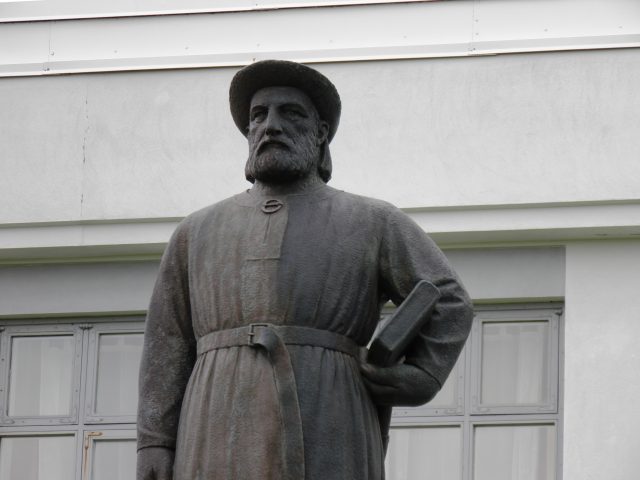
European Diary: Reykholt, April 2022
In my recent two-volume work, Twenty-Four Conservative-Liberal Thinkers, I define conservative liberalism by four principles, private property, free trade, limited government, and respect for traditions (evolution, not revolution). These principles existed of course before four British thinkers, John Locke, David Hume, Adam Smith, and Edmund Burke, presented their systematic defence in seminal books. For example, arguments for private property and limited government are found in two eminent thirteenth century writers who could be called ‘proto-liberals’, the Icelandic chronicler Snorri Sturluson (1179–1241) and the Italian philosopher St. Thomas Aquinas (1225–1274).
A Talk at Snorri’s Place
My interpretation of Snorri as a Nordic pioneer of classical liberal and conservative thought has aroused much interest in Iceland where everybody is familiar with Snorri’s works; an integral and much-appreciated part of the Icelandic heritage, they are read and discussed in all schools: Edda, a treatise on Nordic mythology, Heimskringla, the history of Norwegian kings, and the Saga of Egil, the story of a larger-than-life Icelandic warrior-poet of the tenth century. I was therefore invited to give a talk on 19 April 2022 in Reykholt, the place where Snorri lived and wrote most of his works. This was where he was killed in 1241 on the order of King Haakon IV of Norway who was angry at him for resisting attempts to make Iceland, an independent Commonwealth since 930, a Norwegian tributary. The Argentinian poet Jorge Luis Borges, an admirer of ancient Icelandic literature, has written a well-known poem about Snorri’s execution.
Reykholt is about one-and-a-half hours’ drive from Reykjavik, and the site of a church, a school, a hotel, and an institution devoted to Snorri’s memory. The Icelandic name of the place would in English be ‘Smoke Forest’, because it had both a forest (holt in Icelandic), now mostly disappeared, and some hot springs which emit smoke. It also has a statue of Snorri (depicted above). In my talk I pointed out that it was nothing new to regard Snorri Sturluson as a critic of royal power. This has been argued by scholars before, for example by Professors Sigurdur Lindal, Birgit Sawyer, and Magnus Fjalldal. But what I did in my book was to place Snorri in the conservative-liberal political tradition, alongside Aquinas. They had in common the twin ideas that kings were no less than their subjects under the law, and that they could be deposed if they broke the implicit social contract, in Snorri’s case as determined by customs and conventions and in Aquinas’ case as determined by the natural law. Snorri went even further and argued in Heimskringla, in a famous speech he put into the mouth of an Icelandic farmer, Einar from Thvera, that it was best for the Icelanders to have no king but the law.
New Insights
In my talk I added several considerations to the account in my recent book of Snorri’s thought. For example, in the Book of the Icelanders, composed by Ari the Learned in the 1120s, a reference was made to the inherent conflict in Scandinavia between peaceful and thrifty farmers on the one hand and bellicose and profligate kings on the other hand. This was the ‘Icelandic exceptionalism’ which could also be seen in Snorri’s works. Again, Snorri’s tale in Heimskringla of Iceland’s four ‘protective spirits’ was a subtle intimation to King Haakon IV of Norway not to invade Iceland, as he was for a while planning to do, after skirmishes between Norwegian merchants and Icelandic farmers in the late 1210s. I told the audience that I found it most likely that Snorri had originally written the saga of Olav the Fat (995–1030) who was the first Norwegian king to try and take control of Iceland, and that he had then added sagas about the king’s predecessors and successors. I also suggested that Snorri might himself have composed some of the poems in the Saga of Egil, the first real saga of the Icelanders.
Yet another consideration applies to Snorri’s Edda. It is that the heathen gods, the aesir, were more like a community of equals than a tyranny where just one god had absolute power. The gods met and deliberated, like judges do, and did not take orders unquestioningly from their acknowledged king, Odin or Wutan. In a perhaps primitive manner this was somewhat like the kingship which Aristotle contrasted with tyranny, or the monarchy which Montesquieu contrasted with despotism.
A lively discussion followed my talk with perceptive comments by psychiatrist Ottar Gudmundsson, the author of a book in Icelandic about the personalities of Snorri and his contemporaries from a medical point of view, and the Reverend Geir Waage, former Pastor of Reykholt, an avid reader and interpreter of ancient Icelandic literature.
My forefather
It is an insignificant but amusing fact that I, like almost all Icelanders, can boast of Snorri Sturluson as a forefather. Iceland is unique in that we have reasonably accurate records of most Icelanders over the centuries, from the very settlement of the country by Norwegian vikings in 874, and a well-designed data base run by a private company, deCode Genetics. I am 22nd in line from Snorri. Note that most Icelanders do not have family names: they are just sons or daughters of their fathers. Snorri was for example the son of Sturla, as I am the son of Gissur. The lineage goes like this:
Snorri Sturluson (1179–1241)
Thordis Snorradaughter (c. 1205)
Einar Thorvaldsson (1227–c. 1286)
Unnamed girl Einarsdaughter (c. 1250)
Erik Sveinbjornsson (c. 1277–1342)
Einar Eriksson (c. 1320–1382)
Bjorn Einarsson the Pilgrim (c. 1350–1415)
Kristin Bjornsdaughter (1374–1468)
Solveig Thorleifsdaughter (c. 1415–1479)
Jon Sigmundsson the Lawman (1455–1520)
Helga Jonsdaughter (c. 1511–c. 1600)
Thord Thorlaksson (1543–1638)
Thorlak Thordson (c. 1615)
Gudmund Thorlaksson (c. 1650–c. 1687)
Thorlak Gudmundsson (c. 1682)
Steinthor Thorlaksson (1728–1813)
Bjarni Steinthorsson the Rich (1761–1841)
Kolfinna Bjarnadaughter (1785–1863)
Bjarni Snaebjornsson (1829–1894)
Asta Bjarnadaughter (1864–1952)
Holmfridur S. Jonsdaughter (1903–1967)
Asta Hannesdaughter (1926–2000)
Hannes H. Gissurarson (b. 1953)



 Subscribe
Subscribe